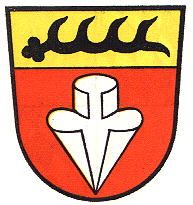Reichenbach an der Fils: Difference between revisions
Jump to navigation
Jump to search
Knorrepoes (talk | contribs) m (Text replacement - "{{media}} Literature : Stadler, 1964-1971, 8 volumes." to "Literature : Stadler, 1964-1971, 8 volumes. {{media}}") |
Knorrepoes (talk | contribs) m (Text replacement - "Literature :" to "'''Literature''':") Tags: Mobile edit Mobile web edit |
||
| Line 18: | Line 18: | ||
The arms are a combination of the deer antler of Württemberg and a local village sign, a plough-iron. The iron is known as a village sign since 1588 where it is placed next to the arms of [[Göppingen]], the city that owned the area in those days. The deer antler was added early this century. | The arms are a combination of the deer antler of Württemberg and a local village sign, a plough-iron. The iron is known as a village sign since 1588 where it is placed next to the arms of [[Göppingen]], the city that owned the area in those days. The deer antler was added early this century. | ||
[[Civic Heraldry Literature - Germany|Literature]] : Stadler, 1964-1971, 8 volumes. | [[Civic Heraldry Literature - Germany|'''Literature''']]: Stadler, 1964-1971, 8 volumes. | ||
{{media}} | {{media}} | ||
Revision as of 14:36, 9 September 2022
This page is part of the German heraldry portal Deutsche Wappensammlung |
Heraldry of the World |
|
German heraldry:
|
Selected collector's items from Germany:
|
REICHENBACH AN DER FILS
State : Baden-Württemberg
District (Kreis) : Esslingen
| German |
Unter goldenem Schildhaupt, darin eine liegende Hirschstange, in Rot eine silberne Pflugschar Origin/meaningThe arms are a combination of the deer antler of Württemberg and a local village sign, a plough-iron. The iron is known as a village sign since 1588 where it is placed next to the arms of Göppingen, the city that owned the area in those days. The deer antler was added early this century. Literature: Stadler, 1964-1971, 8 volumes. Contact and SupportPartners: Your logo here ?
© since 1995, Heraldry of the World, Ralf Hartemink |













